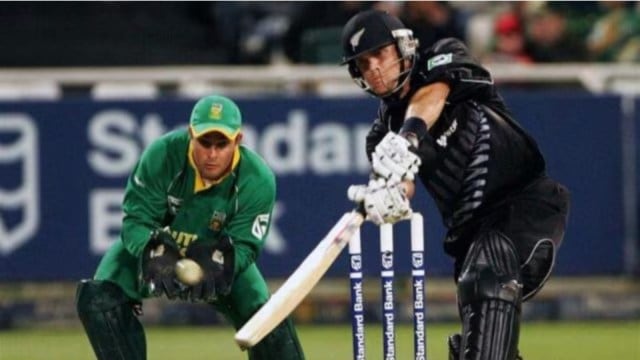Stay updated with the latest sports news across Cricket, Football, Chess, and more. Catch all the action with real-time live cricket score updates and in-depth coverage of ongoing matches.
Once banned for life for match-fixing, Ex-New Zealand cricketer Lou Vincent gears up to educate youngsters on perils of corruption
It has been 10 years since Vincent was suspended for his role in attempting to manipulate matches in various countries - including India, England, South Africa and Bangladesh.
 New Zealand batsman Lou Vincent (R) drives a delivery as he is watched by South Africa wicketkeeper Mark Boucher during his 90 run innings in their One Day International at the Newlands stadium in Cape Town, South Africa October 28, 2005. REUTERS/Howard Burditt
New Zealand batsman Lou Vincent (R) drives a delivery as he is watched by South Africa wicketkeeper Mark Boucher during his 90 run innings in their One Day International at the Newlands stadium in Cape Town, South Africa October 28, 2005. REUTERS/Howard Burditt“I pretty much destroyed my life, destroyed my career, destroyed my future in sport.”
That’s how former New Zealand cricketer Lou Vincent described his regret at being involved in match-fixing, which resulted in a life ban, loss of reputation and inability to do what he loved.
It has been 10 years since Vincent was suspended for his role in attempting to manipulate matches in various countries – including India, England, South Africa and Bangladesh. He had a great start to his international career – he made a hundred on Test debut against Australia – and played 23 Tests and more than 100 ODIs for his country. He described how he fell prey to cricket corruption in 2008 during his stint with the now-defunct Indian Cricket League (ICL) after losing his New Zealand central contract. Vincent told the Australian Associated Press that he had rebuffed and reported the first “down payment”, before peer pressure and avarice got to him.
“I was a prime target to be dragged in; a brotherhood who will look after you,” he said. “The league that we were playing in wasn’t sanctioned by the ICC, so how it was sold to me was like, ‘these games we’re playing in, it’s not real cricket… so you’re not doing anything wrong and everybody’s doing it,’” he recalled.
His role in the game would be to score a pre-decided number of runs in a predetermined number of balls, and then get out.
Vincent, who works as a builder in New Zealand now, feared for his safety and that of his family, described as a “noose around his neck” till he retired from cricket and came clean.
“I’ve had to start life again and missed out on a career in a sport I love,” In a strange way, by owning what I did and being given an opportunity to use my story as a massive educational lesson for the next generation, it’s kind of been worth it.”
Vincent will address a Victoria Police Symposium in Melbourne on Tuesday on corruption in sport.
“I’ve got a powerful message to the next generation and the future generation of sports players where they can easily be manipulated or corrupted into this dark underworld, which I’ve lived first-hand,” he said. “The biggest influence I can have and we can have in the sports integrity world is purely education and the more young athletes know about it, the more they’ll be aware of the signs and the people to avoid.”

































